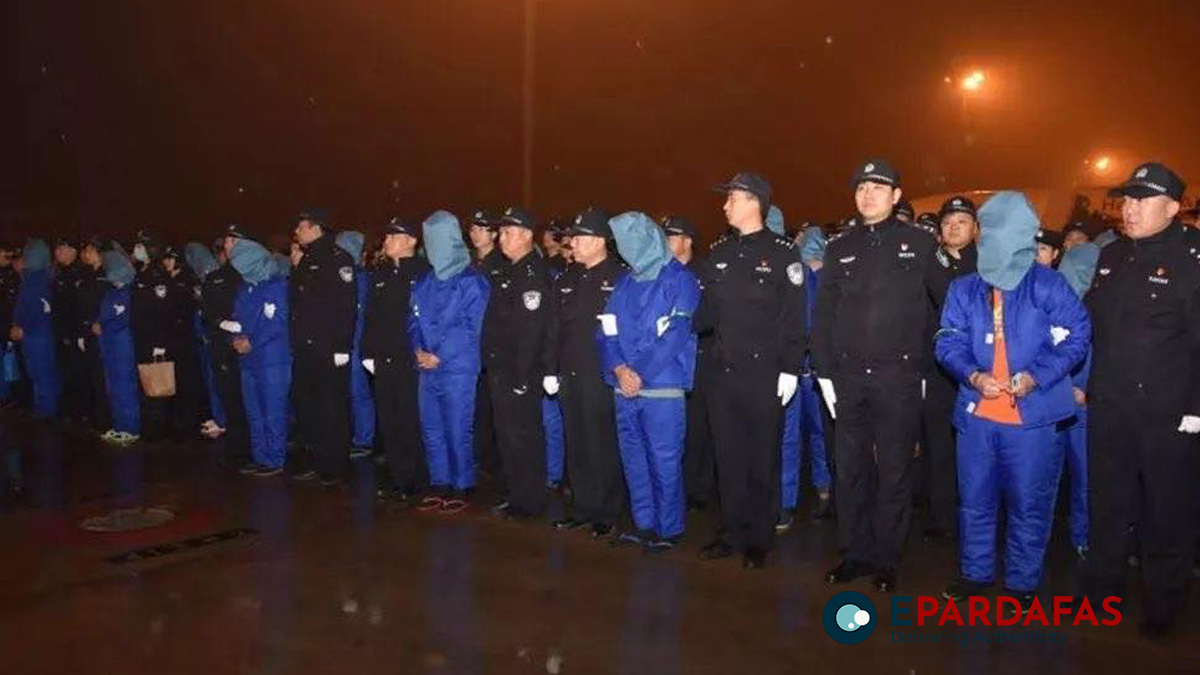
Surge in Chinese Crimes: Offenders Exploit Free Visas to Commit Offenses and Escape
As Nepal continues to strengthen its relations with China, its northern neighbor, and promote ease of movement between the two countries, concerns have been raised about the rising number of criminal activities involving Chinese citizens within Nepal. Recent events have highlighted instances where Chinese nationals have been involved in smuggling activities, including the smuggling of approximately 100 kilograms of gold.
Authorities in Nepal recently apprehended a Chinese national, Jeyung Lyn, aged 37, at the immigration hall of the airport. His arrest came in connection with a joint operation involving individuals from China, Nepal, and India engaged in gold smuggling, with the gold being imported into Nepal via Hong Kong. Jeyung Lyn was reportedly attempting to board a Tibetan Airlines flight bound for China when he was arrested. Further investigation revealed that he had been residing in Kathmandu for the past seven months.
The increase in criminal activities by Chinese citizens in Nepal has raised concerns about the visa policy for Chinese tourists. In 2015, the then Foreign Minister Kamal Thapa signed an agreement with China, exempting Chinese tourists from paying visa fees for visits to Nepal, allowing them to stay in the country for up to 150 days (approximately 5 months). The visa fee exemption was intended to boost Nepal’s tourism industry, which had suffered setbacks due to the earthquake and the Indian blockade. However, this policy has also been associated with significant revenue losses for Nepal, amounting to billions of rupees, and has led to instances of criminals taking advantage of the visa-free access to Nepal and fleeing to China after committing crimes.
Prior to the implementation of the visa fee exemption, Chinese tourists were required to pay a fee of US$250 for a 150-day visa to enter Nepal. The policy was put into effect on January 1, 2016. From that date until January 2022, a total of 523,545 Chinese citizens visited Nepal, resulting in revenue losses exceeding 15.83 billion rupees. It’s important to note that this figure has likely increased since then.
The issue of visa policies and their impact on criminal activities is an ongoing concern for the Nepalese government. While Nepal has provided visa-free access to Chinese tourists as a gesture of goodwill, it appears that similar privileges are not reciprocated by China for Nepalese citizens.

With the influx of Chinese tourists into Nepal, the opening of Chinese-invested hotels and restaurants in the main tourist areas has accelerated. When Chinese tourists promote Chinese investment, the travel expenses spent here returns to China itself. Recently, there has been an increase in the number of Chinese tourists who entered Nepal on free visa, overstayed and engaged in various illegal businesses. Most of the foreign tourists deported by the Immigration Department are Chinese tourists.
It has been found that the Chinese are involved in crimes like gold and human smuggling, cyber crime, herbal smuggling, call bypass, kidnapping. Not only the current quintal of gold, but also the involvement of Chinese citizens in the previous 88 kg gold smuggling. On 4 September 2017, 88 kg of gold was smuggled from Kerung, China through Rasuwagadhi border crossing, and a porter involved was arrested from Chhetrapati, Kathmandu. In Nepal, gold is imported illegally from China, Dubai, Thailand, Hong Kong and other countries.
On 13 July 2023, a Chinese citizen was arrested as the main planner of a gang that lured Nepali citizens to Laos, Thailand, Myanmar and other countries of South East Asia by offering them attractive jobs. The arrested person was 42-year-old Liang Jun, who gave his another name as Johnson and was from Kansu Province, China.

He was arrested from Kathmandu by a team of Human Trafficking Investigation Bureau of Nepal Police. It was revealed that after the gang took Nepalis abroad, they took them as hostages and subjected them to physical and mental torture, forcing them into fraud and labor exploitation.
Similarly, on 23 December 2019, the police arrested 122 Chinese people involved in cyber crimes. They were conducting various criminal activities while staying in Kathmandu. They had been living in apartments and hotels for a long time. The police recovered a laptop, mobile phone and SIM from the arrested persons. Later, they were handed over to China and were punished for cyber crimes.
Similarly, on 1st September 2019 in Kathmandu, Chinese citizens were also involved in hacking the system and withdrawing crores of rupees from the ATM. They were preparing to flee to China after withdrawing the money, but they were arrested after police action.

Similarly, on 23 December 2019, the police arrested 122 Chinese people involved in cyber crimes. They were conducting various criminal activities while staying in Kathmandu. They had been living in apartments and hotels for a long time. The police recovered a laptop, mobile phone and SIM from the arrested persons. Later, they were handed over to China and were punished for cyber crimes.
Similarly, on 1st September 2019 in Kathmandu, Chinese citizens were also involved in hacking the system and withdrawing crores of rupees from the ATM. They were preparing to flee to China after withdrawing the money, but they were arrested after police action.

Chinese interference is increasing not only in smuggling but also in Nepali business. The Chinese are investing especially in the tourism sector. The Chinese have already taken possession of Thamel, the tourist hotspot of Kathmandu. Most of the hotel business owners here are now Chinese. Similarly, Chinese investment is also increasing in other tourist areas such as Pokhara, Chitwan, Butwal. Nepali businessmen have been hit by the occupation of hotels, restaurants and other areas by the Chinese, while the money spent by the Chinese and tourists in Nepal is going back to China.













Comments